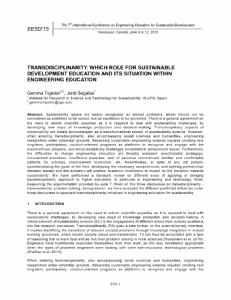Mostra el registre d'ítem simple
Transdisciplinarity : which role for sustainable development education and its situation within engineering education ¿
| dc.contributor.author | Tejedor Papell, Gemma |
| dc.contributor.author | Segalàs Coral, Jordi |
| dc.contributor.other | Universitat Politècnica de Catalunya. Institut Universitari de Recerca en Ciència i Tecnologies de la Sostenibilitat |
| dc.date.accessioned | 2015-06-25T11:25:56Z |
| dc.date.available | 2015-06-25T11:25:56Z |
| dc.date.created | 2015 |
| dc.date.issued | 2015 |
| dc.identifier.citation | Tejedor, G.; Segalas, J. Transdisciplinarity : which role for sustainable development education and its situation within engineering education ¿. A: Engineering Education for Sustainable Development. "EESD15: The 7th Conference on Engineering Education for Sustainable Development, University of British Columbia, Vancouver, Canada. June 9-12: proceedings book". Vancouver: 2015, p. 075-1-075-8. |
| dc.identifier.uri | http://hdl.handle.net/2117/28400 |
| dc.description.abstract | Sustainability issues are widely recognized as wicked problems, which should not be considered as problems to be solved, but as conditions to be governed. There is a general agreement on the need to reform scientific expertise as it is required to deal with sustainability challenges, by developing new ways of knowledge production and decision-making. Transdisciplinary aspects of sustainability are widely acknowledged as a transformational stream of sustainability science. However, when entering transdisciplinarity, also encompassing social sciences and humanities, engineering researchers enter unfamiliar grounds. Advancing sustainable engineering science requires creating new long-term, participatory, solution -oriented programs as platforms to recognize and engage with the macro-ethical, adaptive, and cross-disciplinary challenges embedded in professional issues. Furthermore, the difficulties to change engineering education are broadly analyzed: anachronistic pedagogy, mismatched incentives, insufficient expertise, lack of personal commitment, familiar and comfortable patterns for scholars, overcrowded curriculum, etc. Nevertheless, in spite of any old pattern, operationalizing the goals of the field, developing the necessary competencies, and seeking partnerships between society and the academy will position academic institutions to impact on the transition towards sustainability. We have performed a literature review on different ways of applying or bringing transdisciplinarity approach to higher education, in particular in engineering and technology fields. Deepening the argumentation provided by Julie T. Klein on the three discourses on transdisciplinarity - transcendence, problem solving, transgression - we have analysed the different published initiatives under those discourses to approach transdisciplinarity initiatives in engineering education for sustainability. |
| dc.language.iso | eng |
| dc.rights | Attribution-NonCommercial-NoDerivs 3.0 Spain |
| dc.rights.uri | http://creativecommons.org/licenses/by-nc-nd/3.0/es/ |
| dc.subject | Àrees temàtiques de la UPC::Desenvolupament humà i sostenible::Desenvolupament sostenible |
| dc.subject.lcsh | Engineering--Education |
| dc.subject.lcsh | Sustainability |
| dc.title | Transdisciplinarity : which role for sustainable development education and its situation within engineering education ¿ |
| dc.type | Conference report |
| dc.subject.lemac | Desenvolupament sostenible |
| dc.subject.lemac | Enginyeria ambiental |
| dc.contributor.group | Universitat Politècnica de Catalunya. STH - Sostenibilitat, Tecnologia i Humanisme |
| dc.rights.access | Open Access |
| local.identifier.drac | 16269704 |
| dc.description.version | Postprint (published version) |
| local.citation.author | Tejedor, G.; Segalas, J. |
| local.citation.contributor | Engineering Education for Sustainable Development |
| local.citation.pubplace | Vancouver |
| local.citation.publicationName | EESD15: The 7th Conference on Engineering Education for Sustainable Development, University of British Columbia, Vancouver, Canada. June 9-12: proceedings book |
| local.citation.startingPage | 075-1 |
| local.citation.endingPage | 075-8 |


